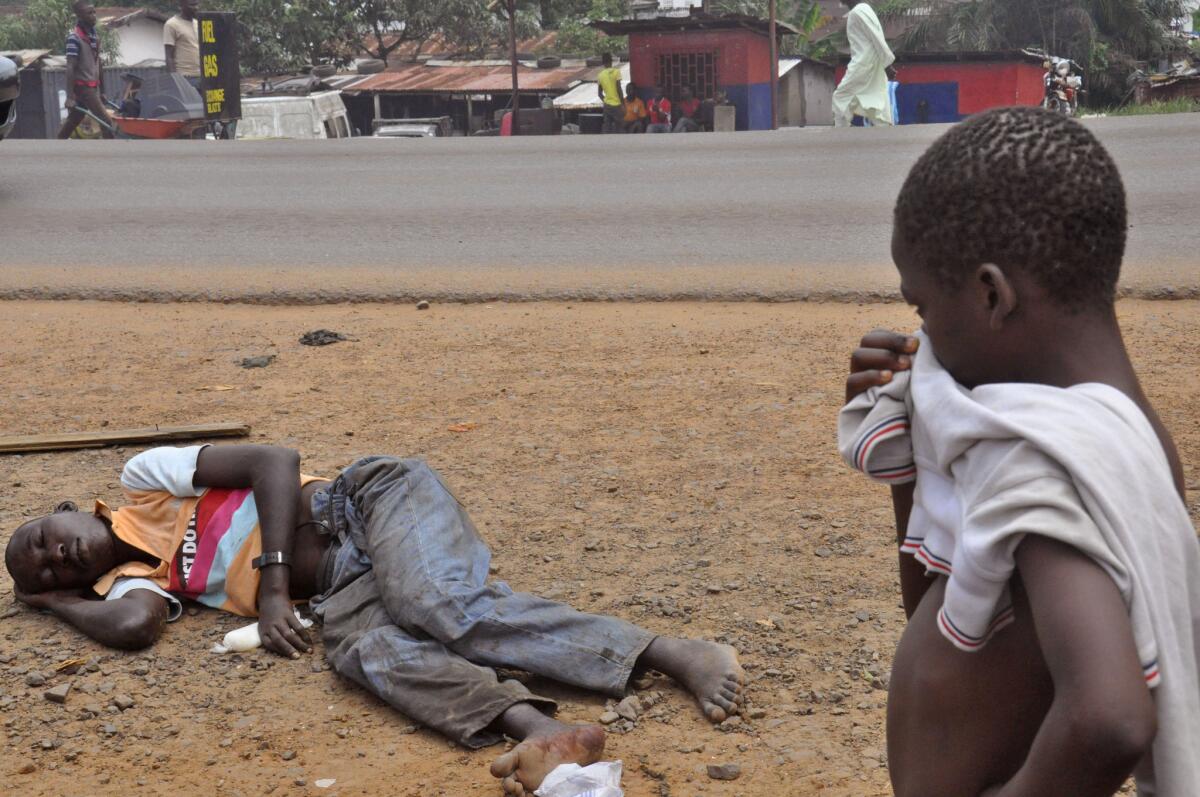Ebola at six months

- Share via
It began with a 2-year-old Guinean boy falling mysteriously ill in a remote village in December, and has erupted into the largest, most deadly Ebola epidemic in history.
This week, six months after the World Health Organization published its first notice of an outbreak, the United Nations health agency published a series of retrospective essays on the crisis.
As of Friday, the WHO has officially reported 6,242 cases of the disease, and 2,909 deaths. Of those fatalities, at least 181 involved healthcare workers.
“Today, one of the biggest barriers to control is violence from an impoverished, terrified and shattered population that does not understand what hit it and fights back the only way it can,” the WHO wrote in an essay on Guinea.
“Last week, health workers in several parts of the country were viciously attacked by angry mobs, forcing some medical teams to flee for their lives. One team hid in the bush for more than a day. Others saw their vehicles vandalized and their medicines and equipment collected and publicly burned, as though such acts might work as a “cleansing ritual.”
Early in Sierra Leone’s outbreak, the virus gained a solid foothold when it struck a well-known traditional healer who died of the illness. At her traditional funeral, where mourners touched the still contagious corpse, the disease spread further.
WHO researchers say that burial alone may have been linked to as many as 365 Ebola deaths.
In Liberia, where “the true number of deaths will likely never be known,” the WHO wrote that “bodies in the notoriously poor, filthy and overcrowded West Point slum, in Monrovia, have simply been thrown into the two nearby rivers.”
So far, rapid responses to Ebola cases in Nigeria and Senegal have maintained control of the virus.
“Conventional control tools -- like early detection, contact tracing, isolation and monitoring of those exposed, adequate supplies of personal protective equipment for medical and nursing staff, and strict procedures for infection prevention and control -- are indeed highly effective when a country’s first imported case is detected early enough and managed as recommended,” the WHO wrote.
“If Nigeria can control an outbreak caused by such a deadly and highly contagious virus, right from the start, any country in the world can do the same.”
The economic and collateral health effects of the epidemic have already made themselves clear. Already among the poorest nations on Earth, Sierra Leone, Liberia and Guinea are experiencing inflation, and lack of food.
“In many areas, hunger has become an even greater fear than the virus,” the WHO wrote. “For example, the fertile fields of Lofa County, once Liberia’s breadbasket, now lie fallow. In that county alone, nearly 170 farmers and their family members have died from Ebola.”
Currently, Western governments and pharmaceutical manufacturers are rushing to prepare experimental drugs, as well as promising vaccines, to fight the epidemic. Those medicines are still months away from being distributed, however.
This lack of approved medication, the WHO said, is due entirely to the fact that past outbreaks have been confined to poor nations for the last four decades.
“The research and development incentive is virtually nonexistent,” the WHO wrote of Ebola drug advancements. “A profit-driven industry does not invest in products for markets that cannot pay.”
There are, however, signs of hope, the WHO says.
Nations like the United States, Cuba and China are sending medical workers and helping to build new treatment facilities to properly isolate the ill.
“There are already signs -- they they are not yet convincing -- that the number of cases has stopped increasing in some districts in Guinea, Liberia and Sierra Leone,” the WHO wrote.
“If these observations are verified in the coming days or weeks, they will signal the end of exponential growth for Ebola in West Africa, and catastrophe will be averted.”
Follow @montemorin for science news







